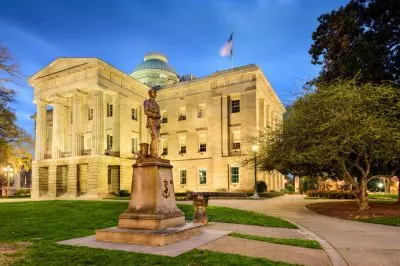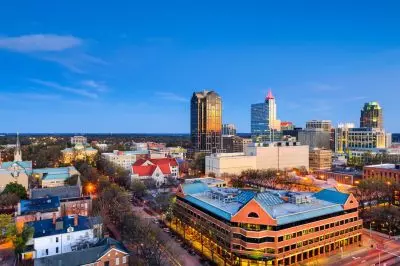 North Carolina’s House of Representatives will finally vote on a proposed bill that seeks to bring four more casinos to the Tar Heel State. Jason Saine, who chairs the House Appropriations Committee, confirmed yesterday that members of the House will cast their votes on the bill later this week, on Wednesday and Thursday. Additionally, the politicians will vote to approve a new $30-billion state budget that will expand Medicaid, the state’s health insurance program for low-income residents.
North Carolina’s House of Representatives will finally vote on a proposed bill that seeks to bring four more casinos to the Tar Heel State. Jason Saine, who chairs the House Appropriations Committee, confirmed yesterday that members of the House will cast their votes on the bill later this week, on Wednesday and Thursday. Additionally, the politicians will vote to approve a new $30-billion state budget that will expand Medicaid, the state’s health insurance program for low-income residents.
Last weekend, the office of Senator Phil Berger published a copy of 2023-GEN-C18B, the legislation seeking to authorize the additional casinos. Said copy contains details on the process under which North Carolina would select the potential casino operators and the locations of the four proposed gambling venues. Legislators have not given up on the idea of legalizing video lottery terminals outside casinos in places like restaurants and bars. However, this proposal still requires additional discussions and is not included in the 2023-GEN-C18B draft.
The newly published legislation differs from an earlier proposal that sought to authorize a single company to run all three non-tribal gaming venues. Under the current draft, different companies could operate each of the proposed casinos. The new bill also contains details about the way local county authorities will approve new casinos to operate in their communities. More counties in Northeast North Carolina could become eligible for developing casinos under the new proposal.
Three casinos would be located outside tribal territories and one could be developed on the territory of the tribal reservation in Lumbee. According to House Speaker Timothy Moore, the non-tribal casinos are most likely to be located in the counties of Rockingham, Anson, and Nash. However, the proposed legislation does not specifically name the counties where the casinos could be located.
Only Tier One Counties Would Be Eligible for Casinos under Berger’s Proposal
 The idea outlined in the bill is to create the so-called “rural tourism districts”, with one casino each and other amenities. Under the proposal, only Tier One counties are eligible for casino development. Another condition outlined in the bill stipulates the counties must have most of their land within ninety miles of an international airport and have fewer than 100,000 residents. Additionally, qualifying counties must not contain tribal reservations with casino gambling as of the beginning of July 2023.
The idea outlined in the bill is to create the so-called “rural tourism districts”, with one casino each and other amenities. Under the proposal, only Tier One counties are eligible for casino development. Another condition outlined in the bill stipulates the counties must have most of their land within ninety miles of an international airport and have fewer than 100,000 residents. Additionally, qualifying counties must not contain tribal reservations with casino gambling as of the beginning of July 2023.
The three non-tribal casino locations would be selected by the state Secretary of Administration. Approved counties can operate no more than a single casino and the venues must be located within at least 75 miles of one another. Each company seeking to build and operate a casino must provide no fewer than 1,750 jobs and pour $500 million or more into the rural tourism districts in the form of private investments.
Another condition is for the companies to have at least one decade of experience in the field of commercial gambling. Another decade of experience in building and running non-gambling real estate projects is also required. County authorities must approve the casino sites through local resolutions. The legislation proposes an excise tax of 22.5% to be imposed on the operators’ gross gambling revenue. Estimates suggest that the three non-tribal casinos could bring in as much as $400 million in revenue into the state coffers.
The tribal casino could be located in one of several eligible counties, namely Brunswick, Hoke, Bladen, Columbus, Richmond, Hanover, Scotland, or Robeson. Eligible companies would be required to pay $500,000 upon submitting their applications on top of $7.5 million in submission fees. Interested companies can start submitting their applications no sooner than the beginning of December. Senator Berger previously sought to include the casino proposal in the budget but House Speaker Timothy Moore argued most Republicans in the House are unwilling to cast their votes on the budget if it includes gambling.